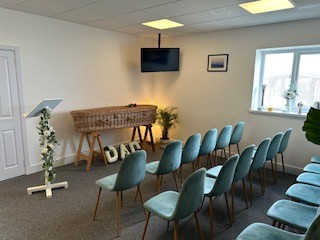As independent family funeral directors with over 20 years’ experience, we provide thoughtful support and care helping you honour your loved one’s life in a truly personal way.

“Very Professional”
Thank you so much for today you made scattering our loved ones ashes. Anniversary a year today very beautiful and the doves especially & for putting ashes into the wooden hearts and necklace you are very lovely people caring and made it very special for us. You are kind and thoughtful the sun came out for a little while. As a family, we would recommend you to others as you are a very professional family-run funeral home with great value and most of all, reliable, friendly, and caring. Thank you for today.

Contact Us
Let our family look after our your family.
Please email us, or for an immediate response particularly out of hours please do not hesitate to contact us:
Please email us, or for an immediate response particularly out of hours please do not hesitate to contact us:
Email
Address
Opening Hours
Monday to Friday: 10am - 4pm
Appointment only on Saturday and Sunday. Our care-line is manned 24 hours a day.
Appointment only on Saturday and Sunday. Our care-line is manned 24 hours a day.
